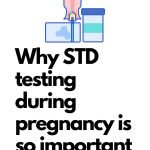👋 I’m so glad YOU are here. Are you looking to also get your partner prepared? This is for BOTH of you. Couples just love it and I know you want to both feel prepared!
STD tests are SO important for pregnant women, your provider will offer screening of a few including chlamydia, gonorrhea, syphilis, hepatitis and HIV. WHY do they test for these sexually transmitted diseases — because they are NOT good for a baby to be growing near by and the exit through the birth canal through. Let’s talk about HOW they test for them, WHY they test for them, WHEN they’ll test for them and what to do if you come up positive on something.
But first, how do I know so much about STD’s? Hi — I’m Hilary, I’m The Pregnancy Nurse. I’ve been a nurse since 1997, and I have worked as a labor and delivery nurse for 20 years. I’ve done a LOT of STD tests on patients, I’ve had the tests myself and I’ve seen a LOT of results — so I think I’m a great resource for you!
What STD Tests are Given to Pregnant Women?
They most often test via blood for:
- Hepatitis (B and often also C)
- HIV
- Syphilis (called the RPR test)
They do swabs in your vagina for:
- Chlamydia
- Gonorrhea
They’re also going to do a visual inspection of the area for any herpes issues (genital herpes or warts) as well as take a history as to if you’ve had them previously (they can do a test if they think it is warranted).
They are recommended to be done on ALL pregnant women during routine prenatal care. If someone shows-up to the hospital without prenatal care we do those test on them as well.
They may also recommend a pap smear that checks for cervical changes that may indicate cervical cancer. They are also going to check for GBS close to delivery, but that is not an STD.
Depending on your history as well as the area you live in, they may test for other diseases as well.
Most often they are done at your first prenatal visit, and may be done closer to delivery time as well.
BTW if you’re in a relationship and looking to make your pregnancy, birth and life after baby better — come join me in here!
Risks Factors for STD’s:
- Multiple sexual partners
- Under 25
- Sexual partner has multiple partners
- Partner has an STD
- Living in an area with a high concentration
- Previously having had an STD
Get more information on STD’s during pregnancy from the CDC: https://www.cdc.gov/std/pregnancy/stdfact-pregnancy-detailed.htm << that page has SO much good information (and is how providers determine what testing they do for you).
Should I get tested if I have no risk factors?
The main risk factor is having sex, and you have had that if you are pregnant.
My personal opinion is that all pregnant women should get tested. I am personally in a monogamous relationship but I am well-aware that the only thing I KNOW has happened is what has happened with my own body. I don’t know what has happened otherwise and I don’t want to risk my child’s lifelong health on my faith in my husband.
If you would prefer not to get tested, please talk with your provider about it.
Often, providers don’t discuss every test they’re going to give you at that first prenatal check-up (because there are a LOT of them). So, if you have questions, be sure and ask them what you are/have been tested for.
Symptoms of an STD
Symptoms can be “silent” often — so it is important to get the tests. However, if you’re having changes in discharge, itching or burning do talk with your provider to check the area. It could be an STD, a bacterial or a yeast infection.
And if you’re interested in staying healthy in pregnancy — grab my safe eating guide:
How are STD’s treated?
Bacterial infections are treated with antibiotics.
Is is MOST important that you:
- Take ALL the antibiotics that are given (if it’s a shot, that is clearly very quick)
- Do NOT have sexual relations until they say you are “clear” to do so
If you, or your partner have an infection you can just re-pass it to each other even if one is “clean”.
Then you get into a situation where you may have bacteria that is resistant to the antibiotics and can’t be as easily treated.
Viral infections (including Hepatitis, HIV and Herpes) have different ways that we deal with it. They can’t be cured during pregnancy (as of this writing), but some do have some antiviral treatment guidelines that can help with some sexually transmitted infections. They may change what happens at your delivery, so talk with your provider about what to expect.
For example, HIV positive moms are usually encouraged to have a C-section vs a vaginal birth because the risk to the baby is lower.
Hepatitis B positive mom’s babies are given a special shot to help baby fight it right after birth.
Honestly, treatment of STD’s is often VERY easy — so get tested so you can easily treat it and move on.
This is super easy too. 🙂
Looking to get prepare for your birth? I have some easy options for you!
~~~~~~~~
– Worried you’re missing something? Grab my pregnancy planner so you don’t miss a thing!
– Thinking about an induction? Grab Inductions Made Easy to feel prepared in just 20 minutes!
– Wondering how to get that baby OUT? Grab Going Into Labor Made Easy so you know how to (and not to) do it!
– Postpartum got you anxious? Check out Postpartum Care Made Easy so you can stay SAFE even when all your attention is on that little on.
🚨 AND if ALL OF IT has got you on edge The Online Prenatal Class for Couples is perfect for you — You’ll feel so ready before you even know it!
~~~~~~~~
No matter WHERE you are at in your pregnancy journey, we have resources that can help!
What are the risks of STD’s during pregnancy?
They can cause:
- Preterm labor
- Infections in the womb or the baby if they are prolonged
- Lower birth weight
- Stillbirth
- Baby’s death shortly after birth
- Eye infections after passing through the birth canal
Most often the issue happens when the baby passes through the birth canal where the disease is, but some can infect baby in the womb and can be very serious.
Rise in Syphilis During Pregnancy
There has been a huge increase in congenital Syphilis in my time as a labor and delivery nurse. I did not see any syphilis for YEARS of my career but there are many positive cases lately. It can have HUGE consequences and must be taken very seriously.
It is important to know that it is PREVALENT in the United States.
Per the CDC Website:
Approximately 40% of babies born to women with untreated syphilis can be stillborn or die from the infection as a newborn. Babies born with congenital syphilis can have bone damage, severe anemia, enlarged liver and spleen, jaundice, nerve problems causing blindness or deafness, meningitis, or skin rashes.
Get more information here.
Prevention of STD’s During Pregnancy
Using condoms with partners who have or have previously had an STD is an important step to keep you and baby the most safe. Talk with your provider about both what is happening currently and your sexual history. Be honest, so they can give you the best advice for both you and your baby.
They may recommend that you abstain from sexual intercourse as you are being treated to be as safe as possible, and it is important to follow that advice!
When you’re honest, they can determine what you are at increased risk for, and they can recommend screening for you during your first trimester, and likely also during your third trimester as well.
There is absolutely NO reason to be dishonest in these scenarios. We see patients with all of these infections frequently, and we see it as something to fight, not something to judge. We really are in your corner, and we just want you safe and happy.
In my experience, some people avoid the screening recommendations because they feel like they trust their partner, which can lead to disastrous outcomes. Even if you are NOT a high risk, public health experts would still encourage you to get perinatal testing done to just be sure — so that STDs aren’t an issue for you or your baby!
It’s also important to be honest with your partner so they know you’re not just getting tested because you don’t trust them, you’re just be sure that baby is healthy. And honestly, they should be glad to know because again — they only know what’s happened on THEIR end as well.
Good communication between partners is SO important for both of you during your pregnancy. Come join me in The Online Prenatal Class for Couples — it is truly the EASY way to get prepared for birth.
And, if you’re not quite sure you’re ready for that whole thing, check out my free prenatal class. It’s your first step toward getting in the driver’s seat of your birth.







 Should You Get the Labor Epidural Before They Break Your Water?
Should You Get the Labor Epidural Before They Break Your Water?
